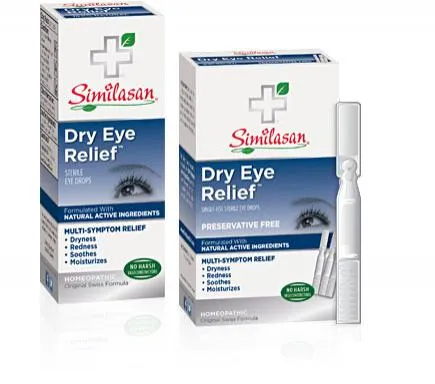
The evidence is piling up: Blue light from phone, computer, and television screens have a detrimental effect on your eyesight.
According to a recent survey, the average person spends more than 50 hours per week on computers and smart phones.
All that screen time can really take a toll on your eyes.
Gazing at blue-light emitting screens is linked to eyestrain and in extreme cases, macular degeneration, a condition that leads to permanent vision loss.
COMPUTER VISION SYNDROME
Do your eyes feel tired, irritated, or dry? Is your vision sometimes blurry? Do you have double vision? Then you may have Computer Vision Syndrome, or "CVS." If you experience any of these symptoms, it's important to take steps to minimize your blue-light exposure.
With the widespread use of man-made light-emitting diodes(LED), and compact fluorescent light (CFL) bulbs, we're exposed to far higher than normal levels of blue light. Even digital displays on alarm clocks emit blue light.
Blue light is just one color of light that electronics like laptops, tablets, and smartphones emit. But it’s the one that’s the most disruptive to circadian rhythms. Think of the circadian rhythm as your body's clock that signals the optimal time to do things, like sleeping and waking up. Blue light also inhibits the release of melatonin – the hormone that makes you drowsy.
Fortunately, there are some easy steps to take to protect your eyes:
REDUCE GLARE
Have a good balance between the light from your display screen and ambient light. Fluorescent bulbs and outside windows can cause harmful glare. You may also want to try an anti-glare screen protector. Note that the anti-glare screen will only reduce glare, it will not reduce blue-light.
GET A BLUE LIGHT FILTER
Many newer devices now come with blue-light filters, often called "night shift" or "night light, which you can set automatically, but if not, try Flux software, https://justgetflux.com or Iris, https://iristech.co
Both are free downloads. I use Flux and am happy with it and I know of others who use Iris and like that as well.

TAKE BLINK BREAKS
It may seem silly, but as it turns out we blink far less when we stare at a screen or intently read or focus. In fact, it's about one-third as often as our usual blink rate. This can lead to eye strain and dry, red eyes. So, set an alert for every hour or so to remind yourself to blink and close your eyes for a few moments to rest and moisturize them.
LOOK LONG
Every 20 minutes or so, gaze at an object at least 20 or more feet away for at least 20 seconds. If you can look out a window onto a green, garden or tree-filled area, that's even better. Green is very soothing. This long-distance gaze provides a much-needed rest to the muscles that focus on objects up close. This simple exercise can really help keep your eyes in good shape.
MOISTURIZING EYE DROPS
I recommend the safe, natural homeopathic Dry Eyes or Computer Eyes drops by Similasan. You should be able to find them easily at any natural health/vitamin retailer, such as iherb.com, luckyvitamin.com, Whole Foods Market, etc.

I don't recommend conventional drugstore brand eyedrops because they typically contain harmful ingredients, such as benzalkonium chloride (BAC. This chemical not only causes cell damage, it can also triggers allergic reactions in some people. There is also a risk of rebound effect with drugstore brands if you use them too frequently.
POSTURE IS IMPORTANT
Here are some basics for good computer posture:
Sit about three feet away from the screen.
The middle of the screen should be about six inches below eye level.
Your elbow joint should be about 90 degrees while you use the keyboard. Use a wrist rest if needed.
HAVE YOU EVER SEEN A RABBIT WEARING GLASSES?

Dark green and colorful fruits and vegetables are excellent sources of vision-protecting antioxidants. They are also rich in lutein and zeaxanthin which in nature, seem able to absorb excess light energy to prevent damage to plants from too much sunlight, especially from intense blue light.
In addition to being found in many green leafy plants and colorful fruits and vegetables, lutein and zeaxanthin naturally occur in the macula of the human eye, where they are believed to act as a sort of filter, preventing the harmful effects of blue light.
If you don't eat enough fruits and vegetables, consider taking an eye supportive supplement containing ingredients such as lutein, zeaxanthin, astaxanthin, bilberry, chrysanthemum, lycii fruit, and/or eyebright. Omega 3 essential fatty acids are also very good for your eyes, amongst other things.

So it looks like the bunnies really are on to something with all those carrots and leafy greens
Taking these simple steps now will help keep your eyes healthy and strong for years to come, despite the demands of this blue-light era.